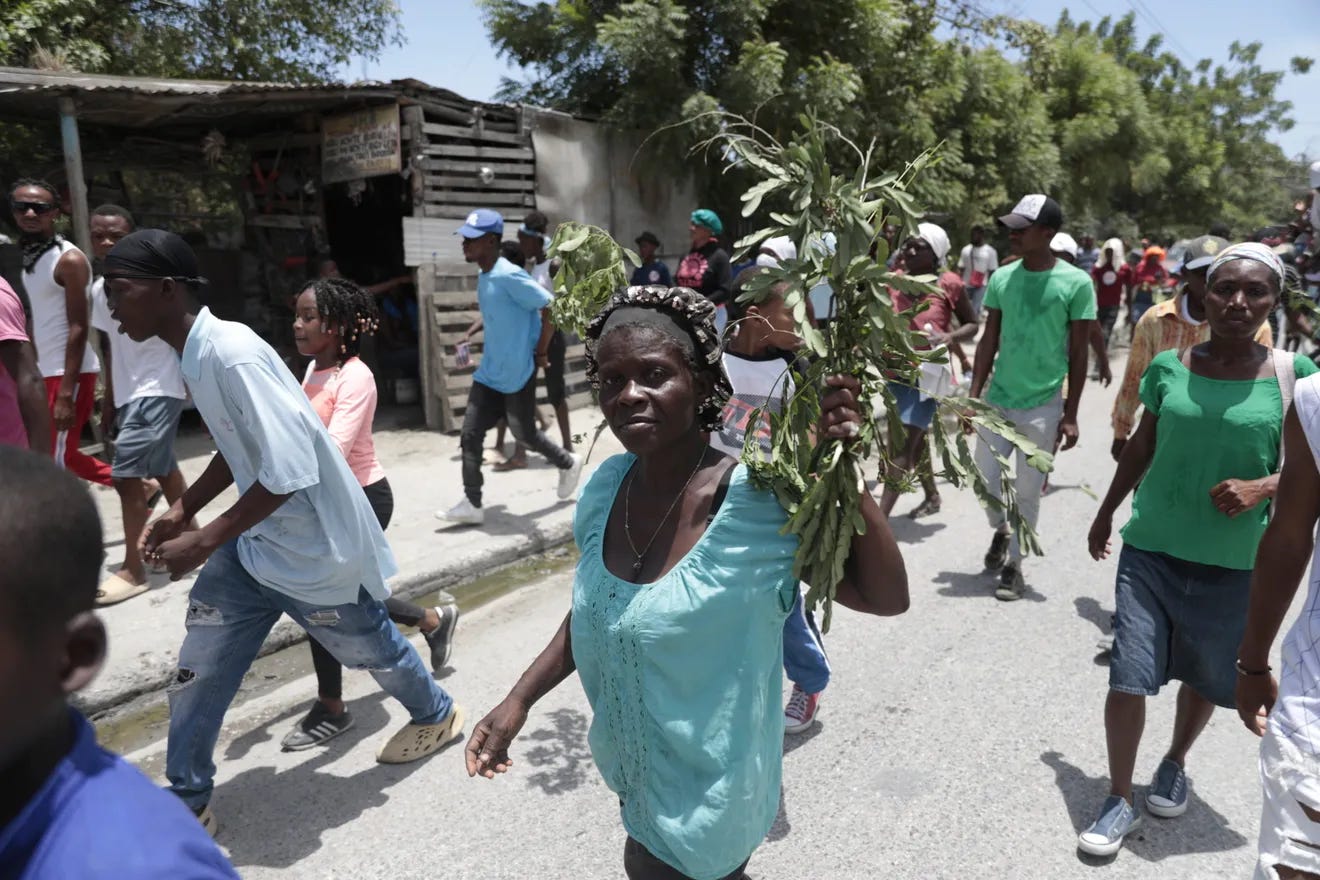
The United States said, yesterday, it would support a multinational police force led by Kenya to be deployed in Haiti. The U.S. and Ecuador will present a U.N. Security Council resolution to authorize the mission, said a U.S. State Department spokesperson yesterday. (Al Jazeera and see yesterday’s post.)
"We are committed to finding the resources to support this multinational force," spokesman Matthew Miller told the press, adding it was "too early" to specify what aid, whether financial or material, Washington might provide. (AFP)
U.N. Secretary-General Antonio Guterres welcomed Kenya's offer to lead an international force to help Haiti's police combat gang violence and encouraged other countries - particularly from the Caribbean - to join the effort. (Reuters)
Haiti's government asked for international security help last year, a request backed by Guterres. But while there has been international support for a rapid action force, until now no country was willing to lead a deployment.
Kenya’s offer to lead a multinational security force comes amid a worsening security situation. Hundreds of Haitians protested in Port-au-Prince yesterday against the kidnapping of a U.S. citizen aid worker and her child. Attacks against aid organizations have pushed many to close, leaving thousands of vulnerable families without access to basic services like healthcare or education. (Associated Press)
More Haiti
Nearly 5 million Haitians -- half of the country -- do not get enough to eat on a daily basis, reports ABC.
Liliane Pierre-Paul, a famed Haitian radio journalist and outspoken champion of press freedom and democracy, died of a heart attack at age 70 — Miami Herald.
Brazil
A police operation on the coast of Brazil’s São Paulo state left at least eight people dead, in an apparent act of retaliation to the killing of an officer by drug traffickers last week. Terrified residents have since reported threats and cases of torture, and Brazilian authorities have called for an investigation into a police operative involving 600 officers, reports the Guardian.
Brazilian President Luiz Inácio Lula da Silva said he is "very confident" about his country's economy, adding he expects Brazil to grow in a "solid" way as he celebrated some recent positive consumer confidence data. (Reuters)
Brazil's jobless rate fell in the quarter through June to its lowest level for the period in nine years, according to the country’s statistics agency. (Reuters)
Regional Relations
U.S. President Joe Biden said on Friday that Lula wants to meet with him shortly on climate. Biden did not say when or where the meeting with Lula would take place. (Reuters)
Ukrainian President Volodymyr Zelenskyy told Globo he would like to meet with his Brazilian counterpart and is ready to come to Brazil if he is invited — though he noted he’s short on time because “here we are at war.”
Mexican President Andrés Manuel López Obrador called for an end to the "irrational" war in Ukraine, yesterday, urging upcoming peace talks in the Middle East to include representation from both Ukraine and Russia. (Reuters)
AMLO said he received a letter from the Israeli prime minister offering to help with a probe into the 2014 disappearance of 43 students, after requests from Mexico to extradite a former top official, reports Reuters.
A letter from 15 U.S. lawmakers to Secretary of State Antony Blinken expresses ‘serious concerns about growing threats to human rights, democracy and rule of law’ under Peruvian President Dina Boluarte, reports El País.
Regional
“Latin America is trending toward more militarized security strategies, and that trend could be consolidated by elections across the region in the coming 18 months. As one consequence of civilian governments and publics embracing hard-line security approaches, the region’s militaries could become more powerful and politically influential in the coming decade,” writes James Bosworth in World Politics Review.
Argentina
Argentina’s central bank reserves fell to the lowest level since 2006, yesterday, after the government made a payment to the International Monetary Fund to avoid falling into arrears, fueling concerns of a potential abrupt devaluation around the presidential primaries in two weeks, reports Bloomberg.
Guatemala
Guatemala’s anti-corruption candidate Bernardo Arévalo is campaigning among rural Indigenous communities as he seeks to rapidly expand his largely urban, youthful base before the runoff later this month, reports the Associated Press.
El Salvador
A move to carry out mass trials against alleged gang members in El Salvador appears aimed at obtaining significant sentences and shoring up President Nayib Bukele’s reelection bid, according to critics. (AFP, see last Thursday’s post.)
Mexico
Mexican drug cartels “are taking the monster truck concept to another terrifying level, retrofitting popular pickups with battering rams, four-inch-thick steel plates welded onto their chassis and turrets for firing machine guns,” reports the New York Times.
Authorities in Mexico’s Chihuahua state have banned artists from singing misogynist lyrics in live music venues — a moved aimed at combating serious violence against women and an enduring culture of machismo, reports the Guardian.
A sharp appreciation of the Mexican peso over the past year has impacted Mexican families who depend on remittances from relatives in the U.S., reports the New York Times.
Ecuador
Ecuadoreans will decide in two referendums this month whether oil and mining projects in key regions of the country can continue, weighing Indigenous and environmental concerns against billions in potential lost income, reports Reuters.
Ecuadorean authorities must investigate threats to journalists Andersson Boscán and Mónica Velásquez, who fled the country shortly after publishing a report on corruption and drug trafficking allegations involving the brother-in-law of President Guillermo Lasso and members of the Albanian mafia, said the Committee to Protect Journalists.




